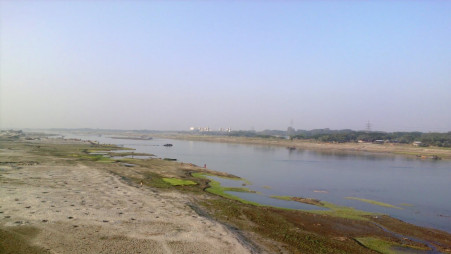Sustainability of Brahmaputra basin hinges on cross-border cooperation
The study has suggested adaptive hydro-diplomacy that exceeds conventional diplomatic practices to address the conflict that exists among basin countries over management of the shared rivers

The transboundary Brahmaputra basin needs to be viewed as a single entity so that collaborative and cooperative actions will help the region to move gradually towards sustainable development, say researchers from International Centre for Integrated Mountain Development (ICIMOD) and Aaranyak in a recent study.
The study, Sustainable Management Options for Healthy Rivers in South Asia: The Case of the Brahmaputra, published in Sustainability Journal 2021, says that to ensure the sustainability of the Brahmaputra river basin and improve the quality of lives and livelihoods of its communities, all basin countries should have relevant national-level policies, a coherent and cooperative basin-level integrated management plan, and a robust knowledge base of future scenarios built around ongoing and anticipated changes in the basin's natural, socioeconomic, and development systems.
The Brahmaputra originates in the Chemayungdung glacier in the Kailash range in the south of the Tibet Autonomous Region (at a 5300 m elevation), traverses China (for a distance of 1625 km), India (for 918 km), and Bangladesh (for 337 km, where it is called Jamuna). It merges with the Ganges (Padma) and then with the Meghna in Bangladesh, and eventually flows into the Bay of Bengal. The Brahmaputra river basin (BRB) is based within China (50.5%), India (33.6%), Bangladesh (8.1%), and Bhutan (7.8%). The river is the fourth largest river in the world regarding discharge at the mouth, and second among the rivers transporting the heaviest sediment load.
The study says it is time to advocate for the ecological health of the rivers in this basin to keep them free-flowing, for which a basin level collaborative mechanism is indispensable, without which the existing threats will multiply and the basin dwellers will lose the benefits of the natural ecological services as well as planned derived benefits of the rivers and their vast water resources.
Importance of maintaining the ecological health of rivers, threat from unsustainable interventions on rivers, challenge of the impact of climate change, and disaster risk reduction warrants transboundary cooperation.
The Brahmaputra river basin is key to the growth of the South Asian region because it is critical to meeting the demands for water and its uses for people and their livelihoods. "In the changing context of the projected climate future, there is a need to balance the multiple demands for water between environmental management, social equity, and sustainable development of the basin communities and ecosystem. With increasing population and changing consumption patterns, it is likely that the demand for water from the Brahmaputra will rise, putting the basin's social, political, and economic stability at risk," the authors say in the paper.
The Brahmaputra is one of the largest river systems in South Asia, providing life-supporting services to about 70 million people. Massive flooding, land erosion, over-exploitation of water, excessive fishing, habitat degradation and fragmentation, exploitation of flood plains, climate change impacts, absence of integrated basin-wide management, and transboundary cooperation are major challenges for the present and future sustainability and development in the basin.
The basin sustains a population of more than 80 million people, comprising more than 200 indigenous, multi-ethnic communities with an average density of 182 persons sq km. About 97% (78 million) of the total population of the river basin live in India and Bangladesh — two of the most populous countries in South Asia.
The communities in the South Asian region have a long history of successfully adapting to changes in the environment although the traditional modes to tackle the changing nature of water hazards, worsened by climate change, have proven to be less effective making them more vulnerable.
Therefore, the study has suggested sustainable and adaptive management options beyond the engineering measures that are conventionally used in such scenarios.
It is important to recognize the importance of integration between upstream and downstream communities through real-time communication of upcoming disasters for preparedness, and inter-state (province), cross-border, and transboundary collaboration on water resource management. This would lead to social benefits while help building trust, encourage the sharing of data and knowledge, and enhance disaster risk resilience.
For the sustainable management and development of the basin, the study says "Adopting a long-term perspective is necessary because it would increase the probability of implementing more immediate actions for adaptation, thereby enhancing both solutions and preparedness for future climate change. This emphasizes the need for a broader vision to become more inclusive and integrate various approaches that reflect critical interactions—both within and between different disciplines. The vision should also extend to all levels of management options, the governance mechanism, and the interface between local, national, and regional scales of intervention for the sustainable management of healthy rivers."
Besides, the planning process, supported by scientific and evidence-based knowledge, calls for local scenarios and voices that are cognizant of and factor in possible local climate and socioeconomic futures for better adaptation strategies.
The Brahmaputra, being a transboundary river, is managed differently in the different basin countries based on their respective national policies. Therefore the study has suggested adaptive hydro-diplomacy that exceeds conventional diplomatic practices to address the conflict that exists among basin countries over management of the shared rivers.
"A multilateral mechanism for regional cooperation needs to be established by the basin countries, based on their shared interest in reducing disaster and climate risk, equitable benefit-sharing from sustainable utilization of the water resources, and regional peace and prosperity of the basin region. Ensuring riverine connectivity and ecological health of the river by keeping the river free-flowing as far as possible should be one of the top priorities in a multilateral, collaborative, basin-wide co-management strategy," the study added.



 Keep updated, follow The Business Standard's Google news channel
Keep updated, follow The Business Standard's Google news channel
















